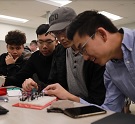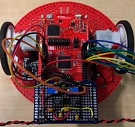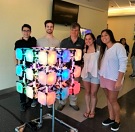Real-World Research Opportunities
At UC Davis ECE, you get hands-on research experience with top-notch faculty mentors and some of the best graduate students in the world. Here are just a few of the many engaging opportunities available in our department that strengthen and support your undergraduate experience:
EEC 1: Introduction to Electrical and Computer Engineering
EEC 1 is a 2-unit project-based course for first-year students. In their first quarter at UC Davis, students in this class are introduced to a range of topics within electrical and computer engineering including embedded systems, physical electronics, circuits, communications, signal processing and systems design.
EEC 10: Introduction to Digital and Analog Systems
EEC 10 is a 4-unit project-based course for sophomore students. In this class, students are briefly introduced to several of the topics that will be covered in detail in their upcoming junior and senior years. At the same time, they design a complete system as the course project that requires system-level understanding about interrelation of different fields such as analog circuits, digital systems, signal processing, etc.
EEC 100: Circuits II
EEC 100 is a 5-unit class for junior students. In the laboratory experiments, students learn to use passive and active filter circuits to boost and/or attenuate different frequency ranges of audio signals. They also learn to cascade filters in order to increase the attenuation on unwanted frequencies. The course also focuses on the trade-offs between filters’ parameters such as selectivity, bandwidth, passband gain, number of stages, etc. (e.g., in a band-reject filter to remove unwanted tones from music signals).
EEC 105: EE-Emerge
EE-Emerge focuses on ECE students in their junior year, in particular underrepresented-minority and first-generation students. EE-Emerge is structured around a three-quarter sequence that leads up to the demonstration of team projects at Picnic Day. EE-Emerge is supported by Texas Instruments, a global leader in semiconductor and integrated circuit technologies.
EEC 113: Power Electronic Circuits
EEC 113 is a four unit class for junior and senior students.
Theory: application and design of power electronic circuits including low drop-out regulators (LDOs), switching DC-to-DC converters, DC power supply circuits, AC-to-DC converters (rectifiers), DC-to-AC converters (inverters), etc.
Laboratory: The lab experiments of the course have a focus on open-loop and closed-loop performance of LDOs and DC-to-DC converters such as Buck, Boost and Buck-Boost. The experiments will involve building discrete regulators on breadboard as well as working with Texas Instruments Power Management Lab Kits (TI PMLKs). The laboratory experiments are accompanied by SPICE simulation of circuits in OrCAD PSpice Designer.
EEC 157A: Control Systems I
EEC 157A is a four unit class for junior and senior students. The focus of the course is to provide hands-on experience to students by developing a new set of experimental modules using the Texas Instruments Robotic System Learning Kit (TI RSLK).
These experimental modules include finding the approximate transfer function of TI RSLK using MATLAB System Identification Toolbox and designing Proportional (P) and Proportional-Integral (PI) controllers for the RSLK.
Our Real World Research Opportunities prepare our undergraduate students to excel in our Senior Design Projects.




